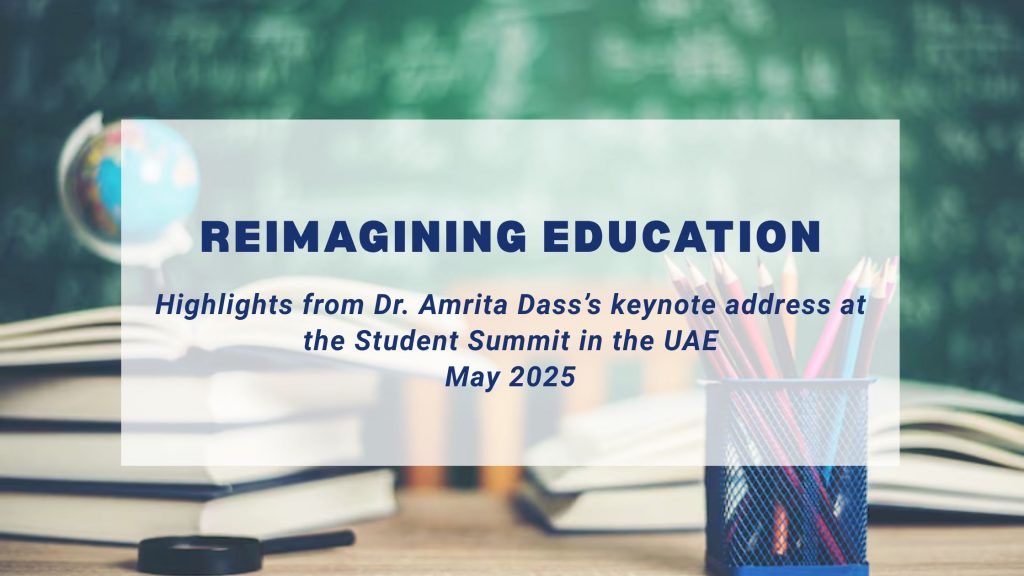
What if schools didn’t just prepare students for the future—but empowered them to shape it?
In her thought-provoking keynote, Dr. Amrita Dass challenged educators, policymakers, and parents alike to envision a new kind of classroom—one where students are not just listeners but leaders, not just test-takers but change-makers.
At a time when AI is transforming careers, communication, and creativity, our education systems must evolve just as boldly. The question is no longer what we teach, but how and why. And the answer, she argues, begins with student agency.
From Curriculum to Creation: Why the Shift Is Urgent
In a world where machines can memorize, calculate, and even write code, what will set us apart? Dr. Dass argues it’s not more information, but more imagination. Not more pressure, but more passion and purpose.
The traditional model of education—standardized, exam-heavy, and teacher-led—isn’t just outdated, it’s actively harming our ability to keep up with the future. Today’s learners need more than content delivery; they need to become creators of value.
And that value isn’t just economic. It’s ethical. It’s emotional. It’s deeply human.
What Does Value Creation in Education Really Mean?
According to Dr. Dass, value creation isn’t about adding more subjects or digital tools—it’s about rethinking the very why behind education. It means equipping students with skills, mindsets, and moral compasses to make meaningful contributions in whatever paths they choose.
At its core, value creation is about turning learning into something that:
- Enhances well-being
- Encourages ethical decision-making
- Prepares students to navigate an uncertain world with confidence and character
The formula she shares:
Value Creation + Happiness = Sustainable Well-being.
Student Agency: The Hidden Superpower
One of the most resonant points Dr. Dass made was this:
Students don’t need to be led—they need to be heard and given opportunities to lead.
When young people are given voice, choice, and responsibility in their education, incredible things happen.
This is student agency—and it’s the cornerstone of educational transformation.
When learners become co-creators, education becomes less about ticking boxes and more about sparking breakthroughs. They become problem solvers, not passive recipients. Curious minds, not just compliant ones.
The 8 A’s: A Roadmap to Future-Ready Students
The 8 A’s framework, originally developed by Gautam Mahajan, a pioneer in value creation, offers a powerful way to think about the skills students need for the future. Dr. Dass discussed how each of these traits can be nurtured in real-world education settings:
- Awareness – Developing emotional intelligence and mindfulness
- Ability – Building real competence, not just textbook knowledge
- Attitude – Fostering ethical, growth-oriented mindsets
- Anticipation – Teaching students to think ahead strategically
- Agility – Embracing flexibility in fast-changing environments
- Adaptability – Learning to pivot with grace in uncertainty
- Ambidextrousness – Balancing logic with creativity
- Action – Moving from intention to meaningful impact
These aren’t just traits—they’re survival tools for a world where the only constant is change.
Creating an Ecosystem Where Students Thrive
What kind of school supports this kind of student? Dr. Dass offered a compelling vision:
- Classrooms that blend tech with humanity
- Projects that tie directly to real-world issues and SDGs
- Learning experiences that are interdisciplinary, entrepreneurial, and ethical
- Evaluation systems that reward creativity and resilience—not just test scores
This is what she calls Value Dominant Learning—where students are the architects of their own growth.
Why This Matters—Now More Than Ever
The biggest takeaway? Student agency isn’t a soft skill—it’s the foundation for the future.
For students, it means:
- Outsmarting—not competing with—smart tech
- Leading with empathy and curiosity
- Turning learning into legacy
For society, it means:
- An adaptive, values-driven workforce
- Innovation that serves communities, not just markets
- Education that raises not just incomes, but collective consciousness
A Powerful Idea Whose Time Has Come
As Dr. Dass reminded us, “There is no force in history more powerful than an idea whose time has come.”
And this is that moment.
Reimagining education isn’t a luxury—it’s a necessity. A system that centers student agency and value creation doesn’t just prepare young people for the future—it hands them the pen to write it.
Let’s make schools not just places of instruction, but ecosystems of transformation.
Like this post? For more such helpful articles, click on the button below and subscribe FREE to our blog.


Dear Dr. Dass
This tremendously valued piece of discourse is absolutely the need of the hour!”not more information but Imagination “so beautifully put and I say an abundance of it.
Thank You so much for sharing these keynotes worthy of re reads several times and inculating it in our daily working journey.
This input in invaluable